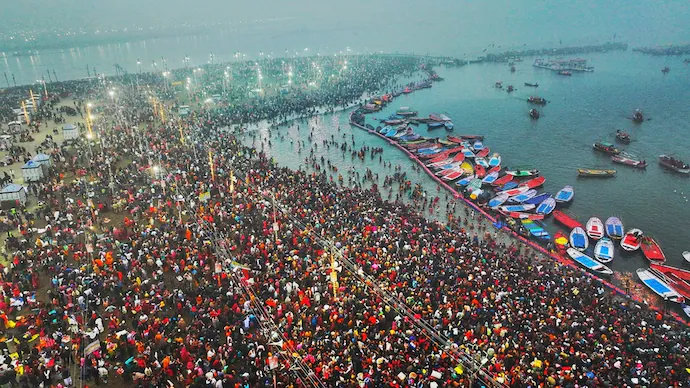The Mahakumbh Mela of 2024, held in Prayagraj, is not just a festival but a living testament to India’s rich spiritual, cultural, and social tapestry. Every 12 years, this extraordinary event gathers millions of pilgrims, ascetics, and devotees from across the world at the confluence of the sacred rivers Ganga, Yamuna, and the mythical Saraswati. The 2024 Mahakumbh holds even greater importance as it coincides with rare planetary configurations believed to enhance its spiritual significance. However, beyond its spiritual core, the Mahakumbh is an intricate blend of cultural expression, social unity, and legal frameworks that ensure its smooth conduct.
Spiritual Significance
The Mahakumbh is rooted in ancient Hindu beliefs and mythology. According to legend, during the churning of the ocean (Samudra Manthan), drops of nectar (amrita) fell at four locations: Prayagraj, Haridwar, Ujjain, and Nashik. The Mahakumbh commemorates this celestial event and offers an opportunity for devotees to cleanse their sins and attain moksha (salvation) by taking a holy dip at the Triveni Sangam. This spiritual act is not merely a ritual but a profound declaration of faith, devotion, and hope for liberation. For millions, the Mahakumbh is a journey of self-purification and reconnection with the divine.
Cultural Grandeur
The Mahakumbh is a vibrant showcase of India’s cultural heritage. The festival grounds transform into a microcosm of the nation, representing diverse languages, traditions, and rituals. Akharas (religious sects), sadhus (ascetics), and spiritual leaders participate in grand processions, offering a visual spectacle of devotion. Vedic chants, classical music, and religious discourses enrich the atmosphere, making it a cultural extravaganza that captivates attendees and onlookers alike. Temporary settlements and cultural exhibitions highlight the rich traditions and practices of India, creating a living museum of its spiritual and artistic history.
Moreover, the Mahakumbh plays a pivotal role in preserving and transmitting knowledge. Scholars, philosophers, and devotees engage in discussions on ancient texts and spiritual teachings, fostering a deeper understanding of India’s philosophical roots. This cultural exchange transcends borders, attracting international visitors and fostering global appreciation for Indian traditions.
Social Unity
The Mahakumbh is a powerful symbol of social harmony and equality. People from all walks of life, regardless of caste, creed, or socioeconomic background, come together as equals to participate in the festival. The shared experience of devotion and faith creates a sense of collective identity, reinforcing the principles of unity and coexistence. For many, the Mahakumbh is a space where societal barriers dissolve, and humanity connects on a deeper spiritual level.
The festival also provides an opportunity for selfless service. Thousands of volunteers, organizations, and government agencies work tirelessly to ensure the comfort and safety of the attendees. Free food, medical aid, and temporary shelters are provided, reflecting the spirit of generosity and care that defines the Mahakumbh.
Legal and Administrative Framework
While the Mahakumbh is a spiritual and cultural marvel, it also demands meticulous legal and administrative planning. The Allahabad High Court recently addressed key legal issues surrounding land allotments for the festival. In a notable judgment, the court ruled that no individual or organization could claim a vested right to a particular piece of land based solely on prior allotments. The court emphasized that the growing scale of the Mahakumbh necessitates equitable and policy-driven land distribution to accommodate religious institutions and organizations.
In preparation for the 2024 Mahakumbh, the High Court of Judicature at Allahabad issued orders for the deployment of officers at specialized camps at VIP Ghat and Arail Ghat. Section Officers, Review Officers, and Assistant Review Officers from various departments, including administration, criminal bail, and judicial chambers, have been assigned roles to ensure smooth functioning. These legal measures demonstrate the intersection of tradition and governance, where law plays a crucial role in maintaining order and fairness in a mega event of this magnitude.
Economic and Global Impact
The Mahakumbh also has a profound economic impact, driving tourism, generating employment, and boosting local businesses. The festival attracts millions of domestic and international tourists, creating opportunities for cultural exchange and economic growth. Its global appeal positions India as a hub of spiritual tourism, enhancing its cultural diplomacy and soft power.
Conclusion
The Mahakumbh Mela 2024 is more than a religious event; it is a multifaceted phenomenon that integrates spirituality, culture, social unity, and governance. It reflects the harmonious coexistence of faith and law, tradition and modernity. As millions gather to celebrate this sacred event, the Mahakumbh stands as a testament to India’s timeless values, resilience, and the unifying power of faith. It is a celebration of humanity’s collective journey toward the divine and a reminder of the cultural and spiritual wealth that defines India.

